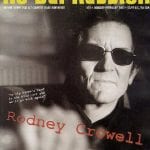Mason Jennings – Broadening the view
Not so long ago, Mason Jennings was rolling burritos by day and writing idiosyncratic, oddly metered folk-rock songs by night. Transplanted from Pittsburgh, he says he was “a total loner,” with no fans, no band, and a self-pressed CD that, according to the liner notes, he had “written, produced, arranged, performed, and recorded” entirely alone. It gathered dust in an apartment in south Minneapolis that he described on the album’s opening track as “just a room with the drums in the middle/A couch along the wall that works as my bed.”
Jennings’ ensuing journey from isolation to local adulation began with one lucky break: His trio, still raw, was asked to open for Dave Pirner’s side project the O’Jeez at the 400 Bar in Minneapolis. When Pirner canceled, Jennings filled in so admirably that the club gave him a weekly gig.
Soon after, Jennings self-titled disc — a brief but intense drifter’s diary of identity (“Nothing”), interdependence (“Butterfly”), Zen love (“Darkness Between The Fireflies”), and rape and revenge (“Godless”) — scaled the local college radio chart. Crowds packed the Thursday night shows, rapt by the thin, pale vocalist and guitarist who seemed to feel his words and music so deeply it was difficult to separate singer from song.
A flurry of local accolades followed, and the Mason Jennings Band went into the studio and cut a new album of songs that had become fan favorites. Then, amid a bout with mononucleosis during late 1999 and early 2000 (during which he listened only to jazz “to challenge myself,” he says), Jennings decided to scrap the completed second album, realizing he’d made it to please his fans but not himself.
He recruited a pair of new players — Brazilian drummer Edgar Oliveira and jazz saxophonist Chris Thomson — better suited to his latest notebook full of songs. They joined Jennings and holdover bassist Robert Skoro in the studio to record Birds Flying Away, which Jennings released himself in September.
The debut disc (which has sold more than 12,000 copies) came off as a cross between Bob Dylan, Nick Drake, Lou Reed and Neutral Milk Hotel. The follow-up adds Spider John Koerner, Sergio Mendes, Peter Tosh and Bobby Seale to the mix. The new band allows the songs to stretch and breathe, while Jennings’ lyrics, once so intimate they felt almost claustrophobic, now articulate a sweeping utopian vision of perfect love, equality, beauty and faith.
It’s an album bursting with affirmation of an artistic credo that has little to do with fans, awards, and expectations. “I think that [the purpose of] music, of art, is to try to make yourself the person you want to be in the world,” Jennings says. “I’m singing to try to heal, not to get a record deal.”




